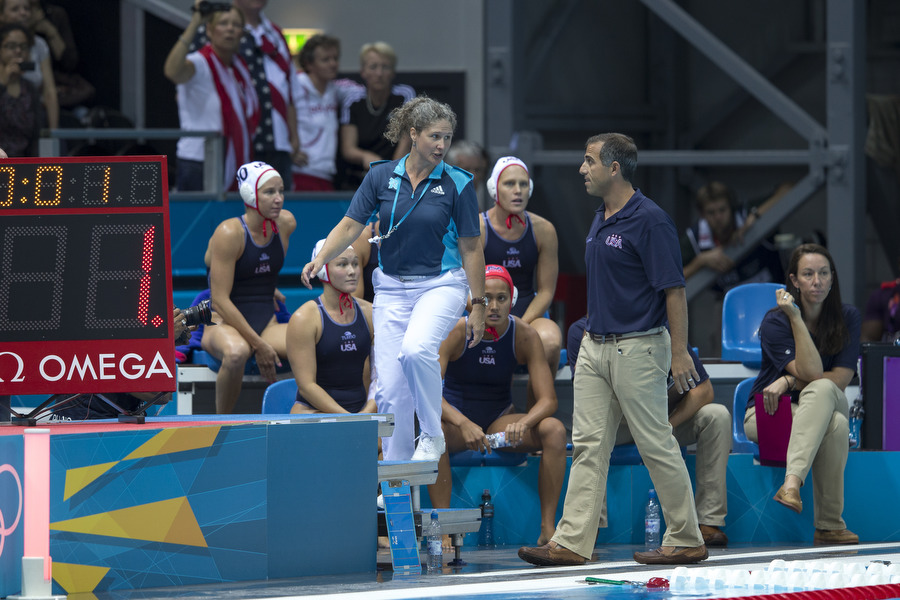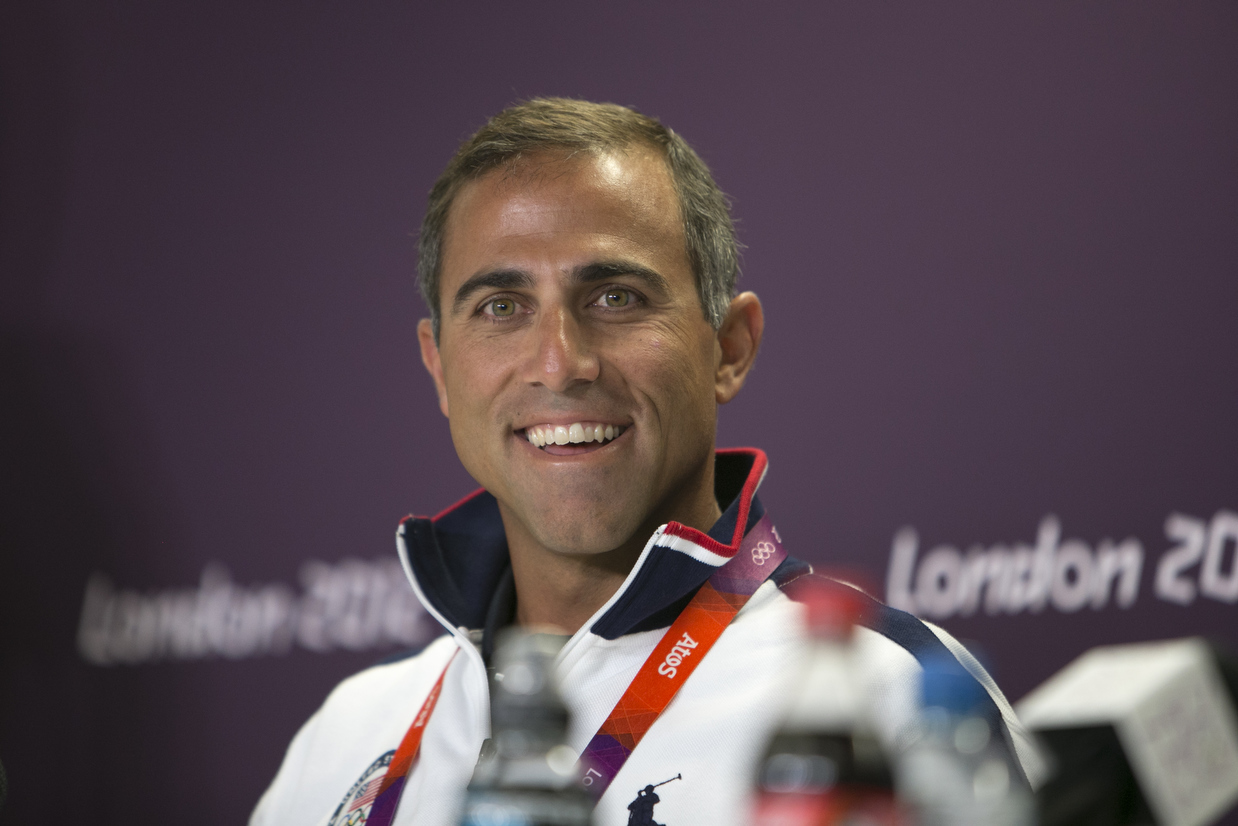It is reasonable to wonder why a story about a water polo coach getting the U.S. Olympic Committee's top award for sportsmanship and fair play would begin with a reference to the award this week of the Nobel Prize in physics for the discovery of something called the Higgs boson particle.
The Higgs, as it is known among physicists, has in common parlance come to be called the "god particle," because it explains -- well, everything. It has to do with how things acquire mass. More elementally, as the New York Times' brilliant science writer Dennis Overbye explains, it is that the cosmos is framed by simple, indeed elegant, laws. At the same time, everything interesting -- in particular, us -- happens because of lapses or flaws in that elegance.
That is, because of a mistake.

Our world is so imperfect. It's the mistake, and the response, that is forever so compelling.
In the semifinal round of the women's water polo tournament at the 2012 London Olympics, Adam Krikorian, the U.S. coach, made a tremendous mistake.
With just one second to go, the Americans up by one goal over Australia, 9-8, he called a timeout.
Australian captain Kate Gynther's shot had just rattled off the crossbar. Krikorian thought the ball had ended up in the hands of the American goalkeeper, Betsey Armstrong. He called time. He thought everything was fine and the Americans were on their way, after a hard-fought game with the Aussies, to the gold-medal game.
Suddenly, it was not fine. The officials began huddling.
It wasn't just that the stakes were obviously high. Here, again, was history.
For more than a decade, the U.S. women's water polo program had been on nothing less than a quest for gold.
In Sydney in 2000, at the very first Olympic women's water polo tournament, the U.S. women lost gold -- to Australia -- on a shot made with roughly one second left in the game.
In Athens in 2004, the Americans finished third.
In Beijing in 2008, the Americans again took second, this time behind Netherlands, on a goal scored with just 26 seconds to go.
Krikorian -- who had been the coach at UCLA -- took over the program following Beijing, succeeding Guy Baker. He instilled a new culture. He said, over and again, we are all in this together.
He also made it plain the moment would come -- he didn't know when -- when the players had so bought into the idea of playing not just with but for each other as well as the staff, the coaches and the United States of America that they would know, they would just know, what to do and how to do it.
That, he made clear, was what a team was about.
And -- more.
In our world, so filled with skepticism and doubt, it is so easy, so tempting, to dismiss the idea of a team becoming truly a family. A family is rich with faith and, indeed, with love.
Physics can make incredible things happen. Love, though, is the strongest force of all. It bends time.
When Adam Krikorian called timeout, the problem was this:
Betsey Armstrong did not, in fact, have possession of the ball.
The rules were, as ever, simple: calling time when you don't have possession means the other team gets a penalty shot.
So, with just one second left in the game, the referees gave Australian star Ash Southern the ball. She whipped it past Armstrong. Just that fast, the game was tied. The horn sounded.
Onto overtime.
At the 2011 world championships in Shanghai, the Americans had finished sixth, their worst performance in over a decade. In the final game of that tournament, Australia had beaten the Americans for fifth place, 10-5.
To get to the Beijing final four years before, the Americans had defeated Australia in the semi, 9-8.
Now the Americans, seemingly on their way to the London final, were -- well, what?
"I just made the biggest mistake of my life," Krikorian said this week, recalling the moment, adding, "Immediately all these thoughts go through your head: 'I just cost my team the chance to play in the gold-medal game,' a dream they had been working toward for three or four years, some of them 12 years. There was a lot of battling inside my own head."
He added a moment later, "I typically pride myself on how I perform under pressure. This was something I had never experienced before. It was a bit overwhelming for me. I just remember being speechless. For once in my life, I didn't have anything to say. They came over to me in the huddle. I might have said a couple words. I mostly stared at them like I was looking at ghosts."

The time between regulation quarters is two minutes. Between regulation and overtime it's five minutes. There was still a lot of time left to go.
Krikorian looked at the clock -- 4:10 still to go until the whistle would blow to signal the start of overtime. He said, "It hit me like a ton of bricks. I had to get over it."
He called another huddle.
He said, "We are not going to let some stupid mistake by the coach affect the outcome of this game," explaining now, "I knew I had to say something that would immediately allow me to take responsibility for the mistake."
That plain. That simple. That elegant.
"That second meeting Adam had with us, bringing us all together, admitting, 'Guys, I made a mistake,' moving forward from that -- that showed all our team strength," said center Annika Dries, who is now 21 and playing both at Stanford and for the U.S. national team.
There really were no words thereafter: "The one thing I do remember is the eye contact I made with my teammates, the coaching staff, how determined we were and how there didn't even need to be words expressed: 'We got this. We are going to do this together.'
"I was swimming back and forth. I looked up at Adam and I just nodded. He knew and I knew that no matter what, we were in this together."
Attacker Courtney Mathewson, now 27, is also still on the U.S. national team. She had played for Krikorian at UCLA, graduating in 2008.
She said, "We knew he had made a mistake. But we make mistakes all the time. Everyone makes mistakes. This was our time to come together and prove to him that it was really just another bump in the road and we were going to get to where we wanted to be at the end.
"… We nodded. We looked each other in the eye. There was a little touch. We could feel the electricity within us at that moment. We could feel it was going to work out. We had done everything possible to prepare when things weren't going our way.
"After that second meeting, we could have been playing anybody at any time. But we knew. We were playing for each other and for Adam.
'And we dominated. It was straight domination."
Halfway through the first of the two three-minute overtimes, Maggie Steffens, then just 19, hit a skip shot. Then Kami Craig, who had also played on the 2008 Olympic team, hit from close range to make it 11-9.
That's how the game, finally, ended.
Two days later, the U.S. would defeat Spain, 8-5, for gold.
On Friday, amid the USOC's annual assembly in Colorado Springs, Colo., Krikorian will receive an award handed out each year since 1985, the USOC citing him for demonstrating "composure, crediting his players for showing resolve and making the best of a difficult situation."
"Ironically," he said, "for me what was unquestionably the worst mistake in my coaching career [turned out to be] my most rewarding moment," adding, "The culture I wanted to create, and dreamed of creating, was just staring at me in that intense moment. It was a great feeling, a very rewarding feeling."
He also said, "The thing I keep coming back to is as a coach you are in a position of influence. You have a unique opportunity to influence your athletes, your sport, your country, the Olympic Games. That provides a unique opportunity, a unique time to have an influence on the world, even if it's two seconds, five seconds, 10 seconds."
Ladies and gentlemen, particle physics may well be brutally difficult to explain. But in matters of team chemistry, it's easy: Adam Krikorian, winner of this year's Jack Kelly Fair Play Award.








